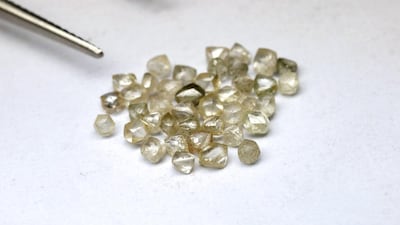The UAE is considering introducing blockchain technology to the global trade in precious stones to help prevent “conflict diamonds” getting on to the market.
Blockchain is an internet-based book-keeping system that provides a permanent record of financial transactions. Applying it to the diamond business could establish a tamper-proof record of the provenance of diamonds.
Ahmed bin Sulayem, who is the current chairman of the Kimberley Process (KP), an organisation that was set up to prevent “blood diamonds” reaching the multibillion-dollar market, yesterday announced the blockchain initiative as part of his midterm message assessing the KP’s progress.
“We have introduced the possibility of using blockchain technology to create a seamless and continued global process for the KP certification scheme,” he said.
Blockchain is one of the most significant elements of the revolution in financial technology – fintech – that has been enthusiastically adopted by the UAE. Both Dubai and Abu Dhabi are setting up centres of excellence in fintech.
Mr bin Sulayem has already had meetings with Dubai’s Blockchain Council and is working on a pilot project that would use the technology to monitor KP statistics.
An update will be delivered to the annual plenary meeting of the KP in Dubai in November.
The midterm report highlights the steps taken by Mr bin Sulayem as chairman of the KP.
He has led initiatives to bring some diamond producers, such as Venezuela and the Central African Republic, back into the diamond-trading community. Both countries have made progress towards resuming diamond exporting in the near future.
The KP under the UAE’s chairmanship has also led the way in establishing an agreed system of diamond valuation. This has been a bone of contention between diamond-exporting counties, mining companies and non-governmental organisations, which complain that producers, especially in Africa, do not get a fair price for their stones.
Mr bin Sulayem held meetings in big diamond trading centres such as Antwerp and London, and organised a special forum on the matter in Dubai, which is now the third-biggest diamond trading hub in the world.
“Only by visiting diamond-producing countries is it possible to fully appreciate the challenges affecting all those involved in diamond production, from government regulators to hundreds of thousands of miners and their families whose livelihood depends on a transparent, accountable industry. This work will continue,” said Mr bin Sulayem, who is preparing for another intense round of visits to diamond producers and traders this autumn.
fkane@thenational.ae
Follow The National's Business section on Twitter

